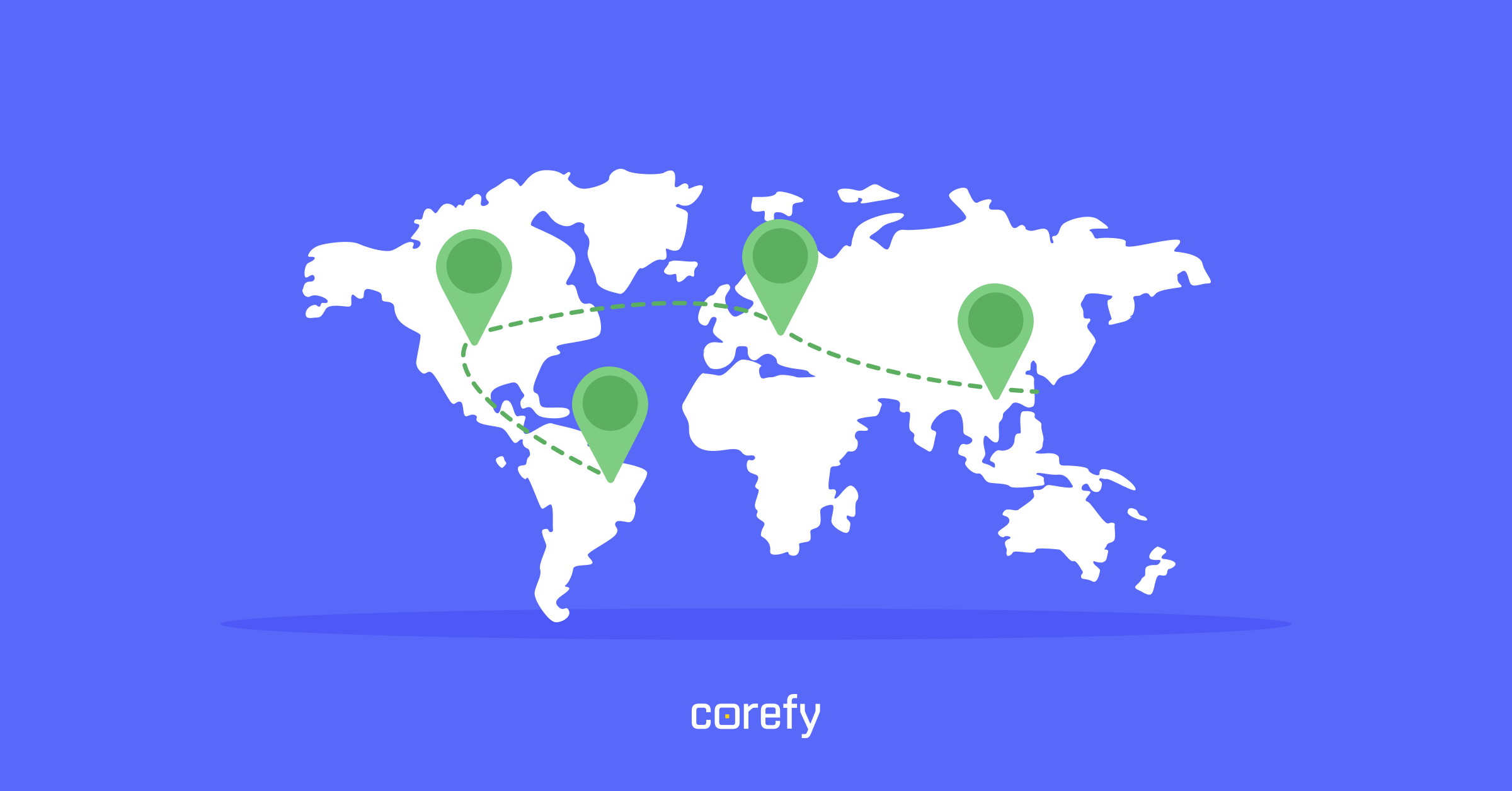Have you heard of Slack, a widespread cloud-based messaging tool? We at Corefy use it daily, just like other 38 million active users worldwide. In 2021, Slack was acquired for $27.7 billion. In 2012, it didn't even exist.
Isn't it astounding to understand that many of today's most renowned, profitable, and globally omnipresent businesses started as pet projects not long ago? Their journey has been primarily facilitated by the possibilities of the Internet combined with well-crafted business expansion strategies.
We've analysed numerous cases and studies to derive the best business expansion practices, gathering them into one blog post for your convenience. Here, you'll also find statistical data on why businesses usually consider expansion, critical indicators of expansion preparedness, and challenges occurring while expanding. And in the end, there are recommendations for taking a shortcut and accessing new markets faster.
Why expand?
Many companies believe that entering a new market would unveil new opportunities, help attract more customers, and earn more money. According to a survey by VelocityGlobal, more than half of tech businesses in the US and the UK named growing their customer base as one of the main reasons to enter new markets.
For some, taking their operations global is a must to remain competitive. Scaling up and accelerating operations is the second most crucial factor for companies.
Besides these reasons that are on the surface, numerous others are not that evident. For instance, expanding to access talent is also common in tech. Interestingly, this reason was mentioned by American companies 10% more often than by British ones. In today's uncertain time, some businesses plan expansion to diversify their portfolio and alleviate the risks, namely the threat of trade barriers. Merger and acquisition deals also account for many respondents' answers.
However, not every business is ready to go global, requiring profound preparation and specific settings.
7 indicators that you're ready for expansion
Here are some signs indicating it's time to conquer a new market or increase your share of existing ones:
- The industry you're in is gaining traction. We hope you do track the progress of the industry you're in. If so, you'll know if the market is saturated or has a place for growth. Analysing and predicting market trends is also helpful and may allow you to seize occurring opportunities earlier than your competitors.
- Your company is ahead of the plan. If you've been outperforming your benchmarks for a few months, it may indicate either the chance to accelerate your activities or the weakness of your benchmarking. Make sure it's the first one.
- You have sufficient resources and a solid growth strategy. You'll need time, money, and endeavour for a successful expansion. Calculate if you're capable of investing in your growth now.
- Your operational infrastructure can handle scaling. If you’ve ensured your current operational systems, processes, and technologies are scalable and can support growth without compromising quality or customer satisfaction, you should consider expanding.
- You’ve gained significant market share in your domestic market. In this case, one way to keep growing your business is to launch new products for the existing customer base, but it’s quite risky and costly. So there’s another way — taking your existing successful offering to a new market.
- You've gathered a strong team of professionals who enjoy working with you. We at Corefy believe the team is what makes the difference. Reliable and committed colleagues who support your aspirations double your chances for success!
- Your reputation crossed the borders before your business did. If you're one of those businesses people crave to have at their location, congratulations — you're doing great! The demand and the word-of-mouth support would facilitate your expansion immeasurably.
The main challenges businesses face when expanding
Let's not get too romantic about international expansion. Besides all the good that going global can bring your business, there's also a fly in the ointment you should be aware of.
Hiring & Marketing
First, regardless of your team's greatness, expanding without hiring additional personnel in the new markets is hard, and international recruiting is tricky. Even if you don't need to hire new people abroad (which is unlikely), you'll have to relocate some of your current employees. It is a challenging task, too. Not everyone in your team may want to migrate to the new location. For those who would, you'll have to provide favourable conditions, take care of the documents and procedures, and cover all the expenses.
Secondly, a significant challenge is understanding and adapting to a new market's cultural nuances and consumer behaviour. Each market has its unique preferences, values, and expectations that can dramatically affect your product's appeal, marketing strategy, and customer service approach. That’s why building brand recognition and trust can be a daunting task. Your brand may already have a loyal customer base and a well-established reputation in your home market. But in a new market, you start from scratch.
Regulations & Payments
Operating in multiple countries exposes businesses to currency fluctuations, impacting pricing strategies, profit margins, and overall financial stability. Managing this risk requires careful financial planning, including using hedging strategies and maintaining flexibility in pricing.
Besides, the new jurisdiction may charge larger taxes than you pay in your original market. Prepare by analysing which taxes, fees, and tariffs expansion to a particular country incurs. Moreover, the payroll process differs internationally – many businesses consider it challenging.
Additionally, legal conditions for your industry may be stricter in the new region, or you may have to comply with some specific local regulations. Safeguarding your intellectual property also becomes more complex as you enter new jurisdictions.
Last but not least, accepting payments from foreign customers and managing international payments would require a study. A lack of expertise in the topic can damage your expansion, and all your other efforts risk falling flat. For 39% of businesses, the complexity of international payments is holding them back.
How to enter new markets faster?
So, how to cope with all the challenges and access the new market faster? Following these four recommendations will boost your expansion.
Consult with a local expert
As we've mentioned, finding a local expert may be difficult and pricey, but it undoubtedly pays off. A person or a company with proven local expertise will prepare you for the market entrance much faster. They'll help you understand local regulations and taxes, find the best partners to start, teach you about local business culture, and provide critical insights into the new market. It's a double win if you find an expert with experience in your niche.
Prepare infrastructure & Processes
For a confident start, think through the workflow for your foreign operations and plan all the processes needed. Organise a team for your new market, buy or lease necessary equipment and software, carefully prioritise the tasks for the first weeks, and decide which processes would be handled by your local team and which would remain the headquarters' responsibility.
Ensure compliance
Compliance with your new market's regulations is a must. The local expert would help you deal with compliance, but if you don't have one, consider hiring lawyers or compliance officers with local legal expertise.
Find a partner to handle payments
The right payment partner can considerably soften the load for you. Besides giving you access to payment methods needed for expansion, a good payment service provider will also offer a solid toolkit for efficient payment management and optimisation. They can also unload the burden of complying with payment security standards, like PCI DSS, and implementing new payment-related technologies, such as 3DS2.0, P2P routing, cascading, etc.
For instance, Corefy is a one-stop shop for growing businesses. Our solution not only allows connecting new payment methods in a few clicks but enables working with multiple payment providers conveniently, managing everything in a single place. We сontinuously work on upgrading our platform to ensure our clients get the best-in-class experience and technology.
Moreover, our team deeply understands the global payment market and has experience dealing with numerous providers and acquirers. We use that knowledge to assist our clients as they scale up, suggesting the best solution for each payment challenge.
Another case happened with our forex client. Their acceptance rates in the African region decreased. After a thorough analysis, we identified that the payment page design needed simplification because the loading time was too long, leading to abandoned carts. We also helped our client choose this region's most relevant payment provider to improve payment acceptance rates. As a result, their conversion rates increased from 51.5% to 88.2%.










.jpg)

.jpg)
